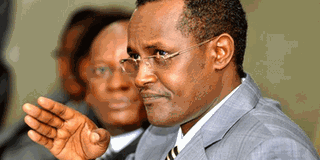Premium
EACC accused of holding back the work of agencies fighting corruption

Ethics and Anti-Corruption Commission (EACC) CEO Halakhe Wako flanked by EACC Officials, addresses journalists at Integrity Centre in Nairobi on November 16, 2015, concerning inquiries on the Eurobond floatation and disbursement. The anti-corruption agency exonerated the government from claims that Eurobond money was stolen. PHOTO | GERALD ANDERSON |
What you need to know:
- Agencies tasked with fighting corruption include the EACC, ODPP, DCI, NIS, FRC, ARA and KRA.
- In what appears to be the old norms of protecting turfs, the agencies now seem to be reading from different directions.
The much touted war on corruption appears to be hiccupping despite a presidential directive that all agencies must work closely.
The agencies were required to be meeting regularly, exchange notes on war against corruption and forge a common plan on cases they are pursuing which appears to be cooling off even as Central Bank re-issued rules that will make it difficult for customers to transact in cash amounts above Sh1 million.
It was in this spirit that the Judiciary increased number of magistrates in anti-Corruption court and established an anti-corruption division in the High Court.
The agencies are Ethics and Anti-Corruption Commission (EACC), Office of the Director of Public Prosecution (ODPP), Directorate of Criminal Investigation (DCI), National Intelligence Service (NIS), Financial Reporting Centre (FRC), Assets Recovery Agency (ARA) and Kenya Revenue Authority (KRA).
In what appears to be the old norms of protecting turfs, the agencies now seem to be reading from different directions.
A case in point is the Chickengate scandal which is yet to be resolved despite British authorities having started investigations, prosecuted the suspects and final judgment having been delivered in a London court.
The Kenyan side is silent and EACC did not immediately issue an update on the progress of investigations after inquiries by the Sunday Nation.
According to sources in government, the loose nut in the wheel that is fighting corruption is at EACC.
Sunday Nation established that the Attorney General’s office, the office that deals with foreign governments on matters investigations, contacted British government on the Chickengate.
The British government in return sent Kenya “materials” relating to the case which were then forwarded to EACC.
INTER-AGENCY RELATIONS
Last week, the DPP, Mr Keriako Tobiko, said he was yet to receive the file on Chickengate from EACC.
Though there is no law that forces them to work together, President Uhuru Kenyatta directed that the agencies work in concert in order to tighten the noose on corruption suspects.
The President was quoted having said he was no longer interested to see people being arraigned in court but individuals responsible for corruption serving prison terms.
One of the strengths the agencies have been using is the Proceeds of Crime and Anti-Money Laundering Act, that allows a judge, on request by Assets Recovery Agency (ARA) to give freezing orders on any suspect even before the trial is concluded.
A case in point is the NYS scam where the chief architect Ben Gethi has been crippled financially even before there is a verdict on the myriad of charges he is facing.
“We cannot deny that EACC has been dragging their feet. There has been no communication from them on Chickengate despite the President requiring results from the agencies,” said a member of the agencies who requested anonymity.
On January 1, Central Bank of Kenya sent a circular to all banks and other financial institutions to adhere to the know-your-customer requirements.
One of the most powerful agencies in the whole scenario remains the Financial Reporting Centre.
Established under the Proceeds of Crime and Anti-Money Laundering Act of 2009, it started real work after the visit by President Barack Obama of United states.
In one of the bilateral agreements US sought to help Kenya fight corruption.
The centre’s main objective is to enforce what in the Financial World is known as KYC (Know Your Customer).
KYC is the mandate given to banks to identify their customers with the aim of preventing money laundering.
Today anyone depositing or withdrawing any amount above $10,000 (Sh1 million) is required to fill in detailed documents at their respective banks on what the cash is meant for and why the money cannot be transferred electronically. They’re also required to give details of beneficiaries if any.





